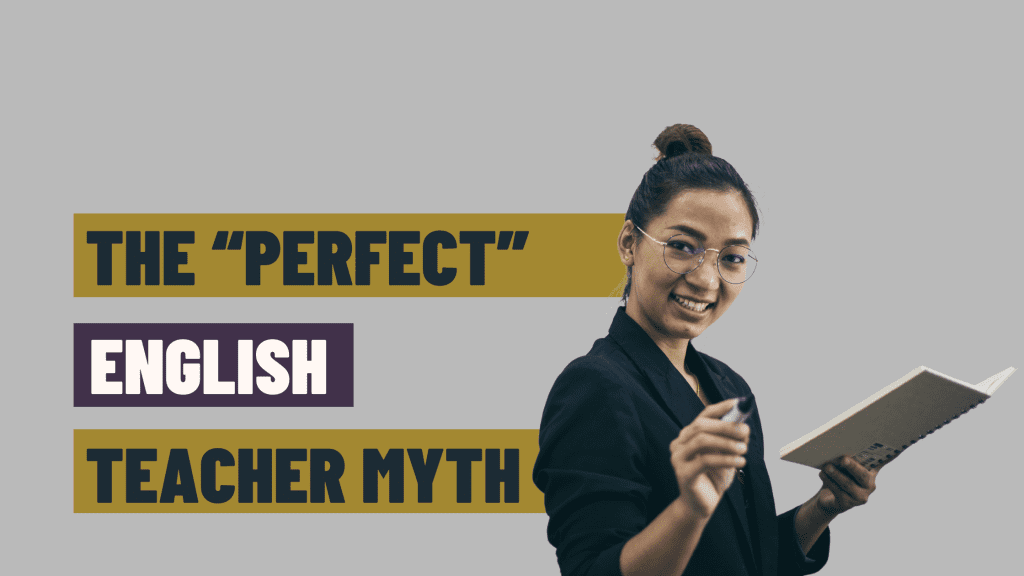“Wait, you haven’t read [insert classic novel]?”
“How can you be an English teacher if you can’t spell [random word]?”
“Don’t all English teachers spend their summers reading classics by the pool?”
Ah yes, the myths about English teachers.
Let me clear some things up:
- I don’t spend my weekends curled up with Dickens
- I definitely just Googled how to spell “accommodate”
- There are many “classic” novels I haven’t read
- Sometimes I enjoy reading nothing deeper than reality TV Reddit threads
- And yes, I occasionally prefer watching the movie version
And here’s the thing – this doesn’t make me a bad English teacher. It actually makes me a better one.

Table of Contents
The English Teacher Mega Myth
Somewhere along the way, we created this myth that English teachers should be:
- Walking encyclopedias of literature
- Human spell-checkers
- Classic novel consumption machines
- Perpetually reading Important Books™
- Living repositories of literary quotes
- Always choosing deep, meaningful texts
But real English expertise isn’t about:
- Having read every classic
- Never misspelling words
- Always choosing literary fiction
- Constantly consuming canon
- Memorizing every plot point
- Being a human dictionary
It’s about:
- Understanding how texts work (like patterns beyond the Hero’s Journey cycle)
- Analyzing patterns that matter (like how universal themes are a trap)
- Building authentic insights
- Engineering real thinking
- Creating conditions for discovery
- Developing powerful readers
The Power of Not Knowing Everything
When I admit I haven’t read something, it shows students:
- It’s okay to encounter texts fresh
- You can build real analysis skills
- Learning continues forever
- Expertise isn’t about memorization
- Thinking matters more than trivia
- Analysis is a skill you develop
In fact, some of my best teaching happens when I’m discovering alongside students. Why? Because I’m modeling real analytical thinking, not just reciting pre-packaged insights.
What Real English Teachers Look Like
The most effective English teachers I know bring vastly different strengths to their practice:
- Some analyze TV shows with the same depth they bring to Shakespeare
- Others see narrative patterns in video game design
- Some bring music analysis into poetry study
- Others draw on their true crime podcast obsessions
- Many read across genres without shame
- All build on their authentic interests
These teachers create powerful learning because they:
- Show how analytical thinking works in real time
- Demonstrate authentic pattern recognition
- Build genuine connections across texts
- Model lifelong learning in action
- Bring their whole selves to teaching
- Create space for real discovery
The Freedom of Being Real
Here’s what happened when I stopped trying to be the “perfect English teacher”:
- My analytical skills got sharper because I was actually thinking, not reciting
- My students became more confident because they saw real learning in action
- Our discussions got deeper because we were discovering together
- My teaching energy increased because I wasn’t constantly performing
- My unique interests enriched our analysis instead of being hidden
- The classroom became a place of authentic intellectual work
Beyond the Perfect English Teacher Persona
The pressure to be some idealized version of an English teacher doesn’t just exhaust us – it actually makes our teaching worse. When we pretend to be walking encyclopedias:
- We miss opportunities for authentic discovery
- We prioritize memorization over thinking
- We create artificial barriers to engagement
- We model performance over learning
- We exhaust ourselves unnecessarily
- We lose what makes our teaching unique
Powerful English teaching isn’t about fitting some idealized mold of the “classic English teacher.” It’s about bringing your authentic analytical expertise to create conditions where real thinking can happen.
Want to discover how your unique interests and expertise could transform your classroom? Take the free Teaching Style Quiz to understand your natural strengths and start building on what makes your teaching uniquely effective.



